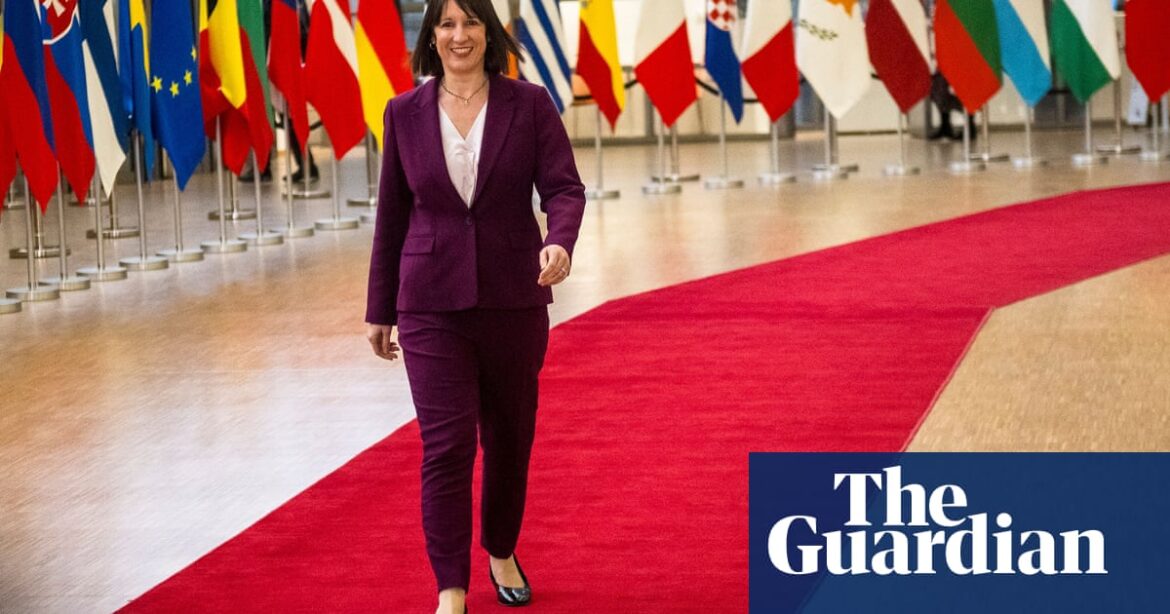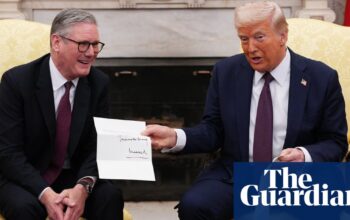
A review of UK-China relations has been delayed until after the chancellor makes her first trip to Beijing next month, the Guardian has learned, amid a row over an alleged spy who befriended Prince Andrew.
Rachel Reeves will travel to China in early January as part of a charm offensive by the Labour government. The trip will be focused on financial services, and Tulip Siddiq, the City minister, is expected to travel with the chancellor.
This will raise concerns among China hawks that ministers are set to reject pressure to subject business dealings with China to higher scrutiny.
Such pressure intensified after the exclusion of Yang Tengbo, a businessman who ran the Duke of York’s Pitch@Palace project in China and is said by security officials to be associated with an arm of the Chinese state. On Monday, Yang asked a court to lift an anonymity order so he could challenge “ill-founded” claims against him and he insisted he was not a spy.
As part of a Labour manifesto commitment, the government is carrying out a cross-Whitehall audit of UK relations with China, which it had originally planned to publish at the same time as Reeves’s trip.
However, the audit has now been pushed back to the spring, a Foreign Office source confirmed. Only part of its findings will be published.
Two sources familiar with the review’s contents said they expected it to make policy recommendations, including on improving the government’s China capabilities.
Ministers are under pressure to declare China a threat to national security by including it in the “enhanced” tier of a new scheme to register foreign lobbyists. But banks and other financial services firms are concerned about the implications this would have on their operations.
The foreign influence registration scheme is part of a shake-up of security laws announced by the previous Conservative government and would require those working for a foreign government to declare their role or face criminal prosecution. Similar schemes have been introduced in the US and Australia.
There would be a basic level of declaration, called the political influence tier, and an enhanced tier for countries deemed a threat to national security, which is likely to include Russia, North Korea and Iran.
MI5 and Home Office officials are said to believe it is vital that China is also designated an enhanced risk. Tom Tugendhat, a former security minister, said on Monday the security services were “very, very clear” the scheme was worthless without that.
A No 10 source said Starmer had not yet made a decision but that they believed his instinct was not to do anything to hamper growth or to thwart an easing of relations with Beijing.
Sources who worked in the Treasury and the Home Office under the former Tory prime minister Rishi Sunak said the scheme was almost ready to be announced shortly before he called an election this summer, despite long-running tensions between the two departments about whether to include China in the enhanced tier.
A former government source said it would be down to Starmer to make the call on how to designate China. They said Sunak had “come down on the side of wanting to do it” but the election was called just as the Treasury began to prepare mitigations.
“When HMT [the Treasury] doesn’t want something to happen, it’s very good at putting grit in the machine and slowing things down,” the source said. “They were trying to work out a way to do it in a way that didn’t kill the City.”
A different Conservative source said: “It took quite a lot of work between the Home Office and the Treasury to get it in a stage where it could be announced … External concerns hadn’t necessarily been completely assuaged – ultimately it would have come down to a decision for the ministers involved.
“What is going on now is both the Treasury is still holding it up because they want to ensure concerns of financial services with links in China are being protected … The institutional Treasury will have been getting loads of representations from externals – this will have [had] a chilling effect.”
Whitehall sources do not expect China’s designation to be resolved until the spring, with the scheme becoming operational in the summer. Dan Jarvis, the security minister, promised to lay the regulations in parliament in the new year and said the scheme was “not ready to be implemented – as has been claimed”.
A former minister involved in the discussions over the scheme in the Conservative government said there was strong pushback within the Treasury and suggested officials would raise the same concerns under Labour. “The Home Office – as always – hadn’t thought it through. You can’t say that anyone visiting China for a meeting has to fill out deals of paperwork and prove they are not a spy,” they said.
“The question is – does the UK want growth or not? They have to realise China is not the same as Russia. The UK is right to have a balanced approach to China. It is one of the world’s largest economies and they are extremely powerful. Despite the rhetoric – that’s exactly what the Americans do.”
On Monday the Chinese embassy in London accused some MPs of having a “twisted mentality towards China” and said “anti-China clamours” were an attempt to “smear China, target against the Chinese community in the UK and undermine normal personnel exchanges between China and the UK”.
Source: theguardian.com



